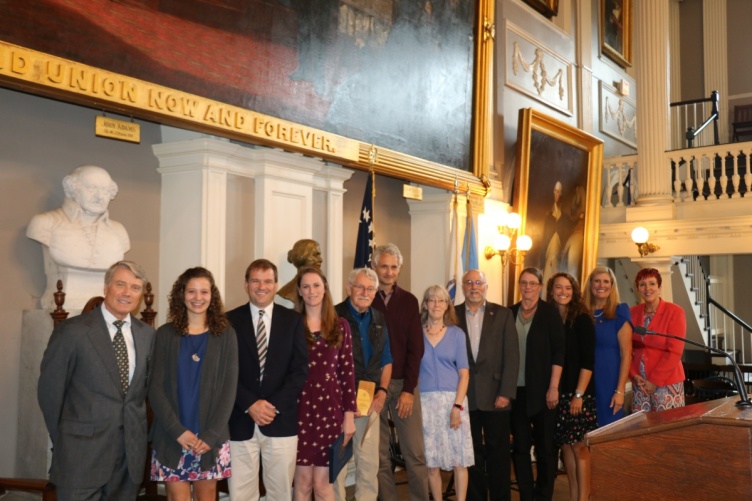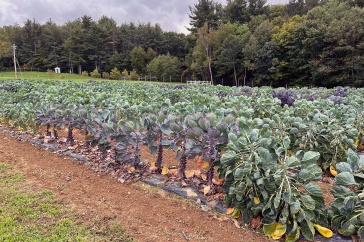
Members of the UNH Center for Freshwater Biology recently were honored by the EPA for their significant contributions and collaborative efforts to address cyanobacteria issues in New England for more than three decades. From left to right: EPA Regional Counsel Carl Dierker, UNH Center for Freshwater Biology members Kate Langley, Shane Bradt, Anne Ewert, Jim Haney, Bob Craycraft, Annette Schloss, Jeff Schloss, Nancy Leland, Sabina Perkins, EPA Region 1 Administrator Alexandra Dapolito Dunn, and EPA Region 1 Deputy Regional Administrator Deb Szaro.
A long-time New Hampshire Agricultural Experiment Station researcher and members of his laboratory recently were recognized by the Environmental Protection Agency for their significant contributions and collaborative efforts to address cyanobacteria issues in New England for more than three decades.
James Haney, professor of biological sciences in the UNH College of Life Sciences and Agriculture, and members of the UNH Center for Freshwater Biology (CFB), have received a 2018 Environmental Merit Award from EPA New England. Haney and his lab members were among 28 recipients across New England honored recently for their work to protect region’s environment.
For more than three decades, the center has been conducting research on both marine and freshwater biotoxins and has been a leader in lake monitoring with its initiation of the NH Lakes Lay Monitoring Program in 1978, one of the first lake monitoring programs in New England.
“UNH CFB staff have been instrumental in ongoing research, and developing tools and techniques for understanding the increasing global proliferation of harmful cyanobacteria blooms and educating the public on the associated impacts to human health and the environment,” said Hilary Snook, EPA Region 1 coordinator of the Environmental Monitoring and Assessment Program.
Cyanobacteria occur in freshwater lakes across New Hampshire and elsewhere. These harmful blooms produce toxins called microcystins. Exposure to large amounts of these microcystins can cause liver damage. Exposure to smaller amounts can cause breathing problems, skin irritation, upset stomach, and other gastrointestinal problems.
The center and EPA have a long history of collaboration on helping solve water quality problems. In the last five years, the center has collaborated with Snook to hold several workshops at the EPA Laboratory in Chelmsford, Mass., to teach new water monitoring techniques to EPA officials and representatives from the six New England states.
Much of the center’s work has been funded by the NH Agricultural Experiment Station. Haney and his colleagues have developed a scientific approach to monitoring and tracking cyanobacteria blooms. The center has pioneered innovative approaches to monitoring cyanobacteria and engaging the public, and scientists have been at the forefront with cutting edge research on cyanotoxins. And, they have developed many tools now used by EPA and states for tracking bloom formation and cyanobacteria development in freshwater. This includes the Cyanobacteria Monitoring Collaborative.
“The goal of the Cyanobacteria Monitoring Collaborative is to create a simple and inexpensive monitoring program that can be employed by professionals and nonprofessionals to collect quantitative data showing changes in cyanobacteria in lakes,” Haney said. “Increasing frequency and intensity of blooms of toxic cyanobacteria throughout the country have spiked interest by lake associations and drinking water agencies in New England as well as from Ohio and California in this unique citizen monitoring program. Cyanobacteria monitoring is still in its infant stage and members of the CFB are already working on refinements and new approaches, such using cyanobacteria pigments for models that can predict when a bloom can be expected to occur.”
With its diverse interests and energetic work of students and faculty, Haney said the UNH Center for Freshwater Biology is strongly devoted to maintaining a high profile in public education and outreach, collaboration with state and federal agencies as well as in basic research.
“Not only has the CFB team been so helpful to the advancement of the science behind cyanobacteria blooms and toxin occurrence in the region and beyond through their research, but also in their willingness to dedicate a large proportion of their time and energy to working collaboratively with all entities to contribute to improvements in clean and safe water. They have significantly heightened awareness of human health effects that harmful cyanobacteria blooms can cause, and have been an exemplary model of what cooperative federalism can be and the benefits that can be achieved as a result,” said Snook, who nominated Haney and the center for the recognition.
Each year, EPA New England recognizes individuals and groups in the six New England states whose are distinguished by their work to protect or improve the region's environment. The merit awards, given since 1970, honor individuals and groups who have shown ingenuity and commitment. Haney previously was awarded an individual Environmental Merit Award in 2016 for his scientific contributions studying cyanobacteria blooms.
"New England is rich with individuals, businesses, and organizations that exhibit their strong commitment to local communities and to a clean and healthful environment. EPA is very proud to recognize these meaningful accomplishments," EPA New England Regional Administrator Alexandra Dunn said.
This material is based upon work supported by the NH Agricultural Experiment Station, through joint funding of the National Institute of Food and Agriculture, U.S. Department of Agriculture, under award number 1007227, and the state of New Hampshire.
Founded in 1887, the NH Agricultural Experiment Station at the UNH College of Life Sciences and Agriculture is UNH’s original research center and an elemental component of New Hampshire's land-grant university heritage and mission. We steward federal and state funding, including support from the USDA National Institute of Food and Agriculture, to provide unbiased and objective research concerning diverse aspects of sustainable agriculture and foods, aquaculture, forest management, and related wildlife, natural resources and rural community topics. We maintain the Woodman and Kingman agronomy and horticultural research farms, the Macfarlane Research Greenhouses, the Fairchild Dairy Teaching and Research Center, and the Organic Dairy Research Farm. Additional properties also provide forage, forests and woodlands in direct support to research, teaching, and outreach.
-
Written By:
Lori Tyler Gula, PhD | NH Agricultural Experiment Station | lori.gula@unh.edu | 603-862-1452
















































